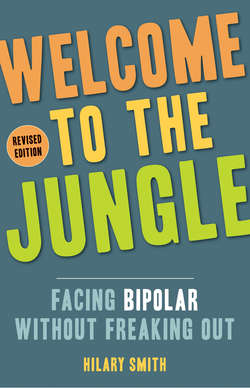Читать книгу Welcome to the Jungle, Revised Edition - Hilary T. Smith - Страница 11
На сайте Литреса книга снята с продажи.
WHAT IS BIPOLAR, ANYWAY?
ОглавлениеAsking “What is bipolar?” is a little bit like asking “What is Christmas?” On the one hand, pretty much everyone thinks they “know” what Christmas is—yet if you asked ten different people, you'd get ten different answers: “Christmas is a Christian holy day celebrating Jesus's birthday.” “Christmas is a consumer holiday about buying stuff.” “Christmas is a pagan winter solstice festival co-opted by Christianity.”
You figure out pretty quickly that “Christmas” is not something that exists independently of people's ideas and fantasies: there's no scientific test for Christmas (“ah, there are ten units of Christmas in the air today!”). On the contrary, Christmas is an idea; a thing that's real because a bunch of people have agreed to talk about it a certain way and accord it a certain structure (Christmas always has a tree and a snowman, even if the snowman is made of plastic).
In this sense, bipolar disorder is a little like Christmas. It's an idea—an idea with lots of research and science and history backing it up (just like Christmas!) but also a construct dreamed up by our culture's medical system and influenced by very specific cultural values and assumptions. (Up until very recently in human history, they didn't have “bipolar” in Egypt or Samoa or Belize any more than they had “Christmas”—they are both ideas that got exported; interpretations of reality, not scientific facts.)
So before we get into anything involving mania or depression or any of those things you expect to find in a book about bipolar, please review the following reminder: “Bipolar” is a word.
It is a word psychiatrists made up so they would have a way to bill insurance companies. Insurance companies won't reimburse psychiatrists for treating suffering, but they will reimburse them for treating “bipolar.”
It is a word psychiatrists made up because it is easier to give patients medication for “bipolar” than to say “you are suffering and I think this pill might help.” People in our culture are uncomfortable taking a pill because it will help them feel better (it feels like cheating), but we're OK with taking a pill if it's treating an identifiable and socially validated disease.
It is a word psychiatrists made up because it would take too long at psychiatry conventions if everyone talked about “my patient who is really sad but also agitated and also can't sleep and also sleeps too much and also drinks too much and also can't quite hold down a job and is also a genius at painting and also had a terrible childhood”—it's more convenient to say “bipolar.”
It is a word our culture uses because we're comfortable with medical problems, and definitely not comfortable with problems that imply there is anything wrong with our social and economic systems. It is easier to say, “You have bipolar!” than to say “The modern world demands people to be rigid and efficient, ambitious and desensitized, and if you are not those things, you're going to have a very hard time.”
It is a word our culture uses because we are comfortable with medical problems, and definitely not comfortable with spiritual experiences. It is easier to say, “You are psychotic!” than to entertain the possibility that someone really did see God, or levitate, or have a profound insight into the Kabbalah, or whatever.
This is not to say that bipolar is a meaningless word or an arbitrary word or a word some kooky psychiatrist cooked up just for the hell of it—but all words have limits, and when we're talking about a word as powerful as bipolar, it's essential to keep an eye on the context.
